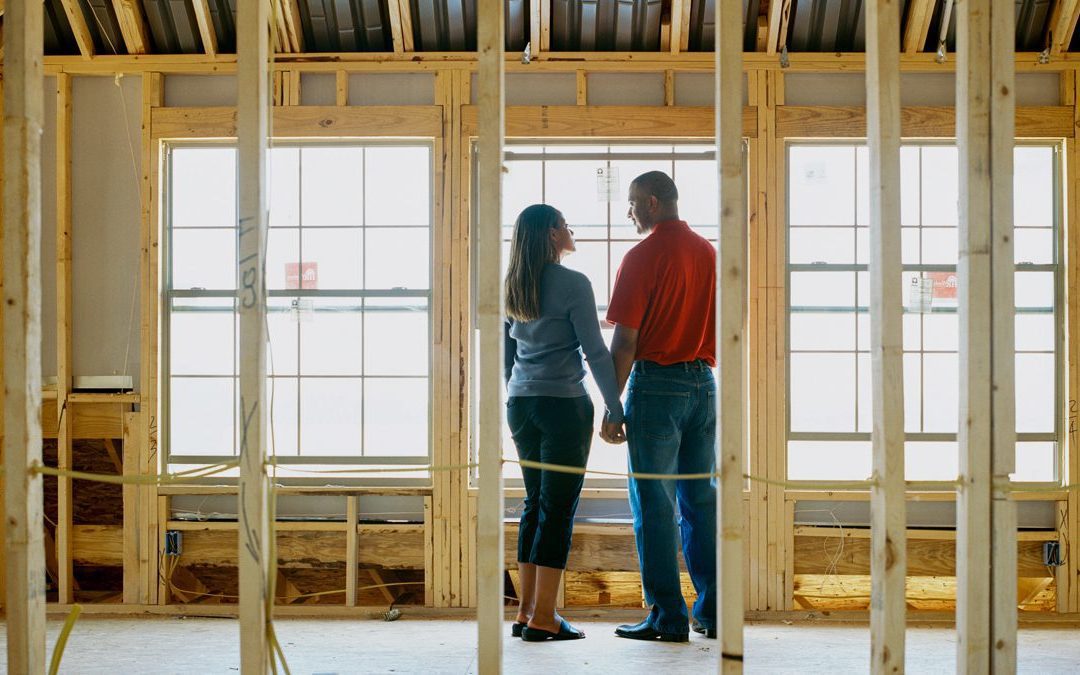Buying New Construction? How Rising Mortgage Rates Can Add Thousands to Your Loan: MABA Massachusetts HomeOwnership
Woo-hoo! You’ve decided to buy a new construction home in a pretty, woodsy development, complete with that never-been-lived-in smell. But we’re here with a reality check to make sure you keep your money in your pocket where it belongs. Because even if you locked in a mortgage rate on your soon-to-be-built house, you could wind up paying more money at closing than you thought.
Why? The rate a lender offers you is good for only a certain period of time and we all know construction delays are not exactly rare. “Typically, mortgage rates are locked in for 30 to 45 days, depending on the lender,” says Mark Polack, branch manager at the Huntington National Bank in Empire, MI. How can you protect yourself now that mortgage rates are expected to keep rising? Here’s how to keep your original interest rate and save big bucks on your new-construction loan.
How a delayed construction affects your loan
Buying a new home still in the development or building stage is a little different from purchasing a resale home when it comes to getting a mortgage. You can’t close on a new construction home or move into the property until the home receives a certificate of occupancy. This certificate is a permit that states the construction company safely built the house according to the standards set by local government officials.
Yet, with the current double whammy of a construction worker shortage and supply chain issues, many of today’s new-construction home buyers face building delays that could extend beyond your thirty to forty five day rate lock. And your interest rate could expire before the home’s finished. So how does that break down financially? Let’s say you’re buying a three hundred thousand dollars home with a twenty percent down payment. If your rate went up 0.5 percent between your offer and closing, you’d shell out an additional twenty five thousand nine hundred and twenty dollars over the life of the loan.
Protect yourself with rate extensions
If you’re facing construction delays and your rate lock is approaching its final days, you might want to consider an extension to lock in your rate with current market terms. Unfortunately, extensions aren’t usually free. You’re paying more upfront to hold on to your lower interest rate. The options vary depending on the lender you choose, but typically the fee to extend the rate lock is 0.45 percent of the loan amount, says Polack.
So if the loan is three hundred thousand dollars, then a thirty day extension would cost one thousand three thousand and fifty dollars. A ninety day extension would set you back four thousand and fifty dollars. “Generally, you would most likely do thirty day increments in the current environment,” adds Polack. “It’s important to know that the options vary depending on the lender you choose, but many offer options of one hundred and eighty day extensions.”
Questions to ask your lender upfront
Still shopping around for a mortgage? Then take the time to do some research and save yourself thousands of dollars. “Some lenders have more flexibility in extending your rate, but others are more rigid,” says Adam Fuller, a senior loan officer at Mortgage 1 in Grand Rapids, MI. “If your lock expires and you’re not with the right lender, you may find yourself bringing more funds to closing or paying more for your monthly mortgage payment.”
Fuller advises asking the following questions when you interview prospective lenders:
- What happens when the mortgage rate lock expires?
- Is there an option to renew the lock?
- Is it possible to extend the lock for no charge?
- Are there fees to extend the rate lock?
- How long can I extend the lock?
- What happens if my house is now complete and rates are now lower?
- Is it possible to secure a reduced interest rate?
Once you’ve talked to at least three lenders about how you can protect yourself with a rate lock extension (or possibly secure a lower rate), you’ll be able to choose the one that offers you the most flexibility.
Consider using the builder’s lender
A builder that constructs a large volume of similar houses in planned developments generally offers in-house financing. And there might be some advantages for a homebuyer to go this route. For starters, the builder might offer incentives think fancier appliances to use its lender. Plus, when the builder has a close relationship with the lender, you’ll likely have certain assurances that construction will be completed on time, meaning the lender will fund the loan as promised. In that case, you might not have to worry about delays and higher interest rates.
“Our licensed mortgage professionals assist every step of the way, working closely with the sales and construction teams to coordinate the entire process from start to finish to avoid unexpected mortgage hurdles or delays,” says Steve Audet, president of Toll Brothers Mortgage Co. A builder’s in-house lender might also provide rate lock protection programs to secure a rate for up to twelve months to offer its customers peace of mind. There might still be a fee to lock in extended interest rates.
So it’s wise to look at the big picture and assess how it will affect your monthly payments and how much you will save over the life of the loan. Don’t assume you are getting the best interest rate and loan terms by using the builder’s in-house or preferred lender. It’s always wise to compare offers from various lenders.
The post Buying New Construction? How Rising Mortgage Rates Can Add Thousands to Your Loan appeared first on Real Estate News & Insights | realtor.com®.
First Time Home Buying in Massachusetts
 MABA Buyer Agents help first time home buyers reduce the stress and frustration normally associated with buying a home or condo – especially for first time home buyers.
MABA Buyer Agents help first time home buyers reduce the stress and frustration normally associated with buying a home or condo – especially for first time home buyers.
As a first time homebuyer in Massachusetts, you can turn to our non-profit organization to help you understand and navigate the complexities of the entire Massachusetts real estate transaction, from mortgage pre-approval until you are handed the keys to your new home or condominium. Each of our member buyer's brokers and agents works only for their buyer-clients and never for the seller of the home or condo that their buyers want to buy.
MABA Buyer Agents will take the time to learn about you and your real estate goals, help you understand your options, including first time home buyer programs, properties and/or condominium associations, estimate real property values and put together a negotiating strategy to help you increase the odds of getting your offer accepted in our competitive Massachusetts real estate market. After advocating to get your offer accepted, your MABA buyer's agent will be there for you at your home inspection and help you protect your deposit through the inspection, purchase & sale and financing contingency periods.
You can buy your first home or condo with confidence knowing that your MABA buyer agent is committed to saving you time and money and helping you make your best home buying decision.
Changes in Massachusetts Real Estate Law & How they Effect the Consumer:
"Thanks to our MABA agent's knowledge, analysis, and guidance, when we found our house, we knew it was the house for us. During the negotiation, we felt confident and secure."
Article From: "Lisa Marie Conklin" Read full article
Get Started with MABA
For no extra cost, let a MABA buyer agent protect your interests



